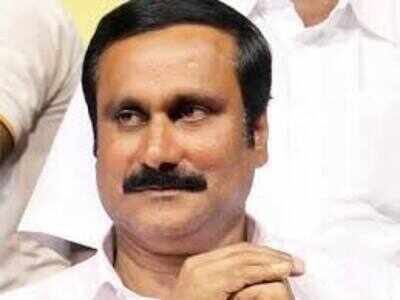
CHENNAI: PMK youth wing leader and Rajya Sabha member Anbumani Ramadoss on Thursday said that the new education policy is against the poor and marginalised section of the society.
"Such an education policy is dangerous," he said.
He also raised voice against the three language policy and said it was aimed at imposing Sanskrit.
Though the NEP’s few programmes are welcome, most of the policy is aimed at linguistics and robbing of school education for the poor.
The former Union minister said in the name of improving the education system, conducting board exams for class III students is cruel and against the Right to Free and Compulsory Education (RTE) Act 2009, which promotes all students up to Class VIII.
“India's rural population usually stop sending their wards to school, if the student fails in any class. Public examination at primary level may put an end to schooling of rural students,” he said
The PMK party’s stand is against board exams for students of classes V and VIII, he said and added that it would create stress among the young children. Hence, there should be no board exams for students upt o Class VIII.
Rejecting the three language policy, Anbumani said it was unacceptable. “Though the Centre says that third language can be chosen at will, the Centre’s rules will give importance to Sanskrit. So, it will lead to the imposition of Sanskrit.”
On ending the system of affiliating colleges with universities, he said giving autonomy to government colleges is welcomed, but extending the same to private colleges would lead to irregularities and malpractices.
He criticised the provision of compulsory entrance exam in the NEP and said, “Rural and poor students are already being denied educational opportunities for a variety of reasons. The entrance exam may not help them in qualifying for higher education. This plan should be dropped.”
In June last year, the Centre sought the suggestions of educationalists and public.
PMK listed several new programmes and schemes to improve the education system, but none of them were considered. This, in deed, exposed that the exercise of seeking public and experts’ views by the Centre was just an eye-wash, he said.
He welcomed the programme to introduce vocational courses in middle school and make mother tongue compulsory for students up to Class V. “It will be even better if the provision of learning mother tongue was extended up to Class VIII.”
He also welcomed the decision to reduce the school education from 12 years to 11 years and converting the undergraduate course from three years to four years. Reducing schooling to 11 years, increasing graduation to four years, allowing graduates to drop out at any time, and dropping M Phil courses are all welcome, he further said in the release.
"The decision to spend 6% of the country's GDP on education is also a move we welcome," he further said.
"Such an education policy is dangerous," he said.
He also raised voice against the three language policy and said it was aimed at imposing Sanskrit.
Though the NEP’s few programmes are welcome, most of the policy is aimed at linguistics and robbing of school education for the poor.
The former Union minister said in the name of improving the education system, conducting board exams for class III students is cruel and against the Right to Free and Compulsory Education (RTE) Act 2009, which promotes all students up to Class VIII.
“India's rural population usually stop sending their wards to school, if the student fails in any class. Public examination at primary level may put an end to schooling of rural students,” he said
The PMK party’s stand is against board exams for students of classes V and VIII, he said and added that it would create stress among the young children. Hence, there should be no board exams for students upt o Class VIII.
Rejecting the three language policy, Anbumani said it was unacceptable. “Though the Centre says that third language can be chosen at will, the Centre’s rules will give importance to Sanskrit. So, it will lead to the imposition of Sanskrit.”
On ending the system of affiliating colleges with universities, he said giving autonomy to government colleges is welcomed, but extending the same to private colleges would lead to irregularities and malpractices.
He criticised the provision of compulsory entrance exam in the NEP and said, “Rural and poor students are already being denied educational opportunities for a variety of reasons. The entrance exam may not help them in qualifying for higher education. This plan should be dropped.”
In June last year, the Centre sought the suggestions of educationalists and public.
PMK listed several new programmes and schemes to improve the education system, but none of them were considered. This, in deed, exposed that the exercise of seeking public and experts’ views by the Centre was just an eye-wash, he said.
He welcomed the programme to introduce vocational courses in middle school and make mother tongue compulsory for students up to Class V. “It will be even better if the provision of learning mother tongue was extended up to Class VIII.”
He also welcomed the decision to reduce the school education from 12 years to 11 years and converting the undergraduate course from three years to four years. Reducing schooling to 11 years, increasing graduation to four years, allowing graduates to drop out at any time, and dropping M Phil courses are all welcome, he further said in the release.
"The decision to spend 6% of the country's GDP on education is also a move we welcome," he further said.

Coronavirus outbreak
Trending Topics
LATEST VIDEOS
City
 Karnataka: Car washed away in stream, narrow escape for passengers
Karnataka: Car washed away in stream, narrow escape for passengers  Bizarre violation of Covid-19 norms: Kerala businessman holds roadshow with new Mercedes Benz, booked
Bizarre violation of Covid-19 norms: Kerala businessman holds roadshow with new Mercedes Benz, booked  Mumbai: Tata Memorial Hospital pitches in for Covid care
Mumbai: Tata Memorial Hospital pitches in for Covid care  Shocking: West Bengal BJP booth worker’s body found hanging from tree, family blames TMC
Shocking: West Bengal BJP booth worker’s body found hanging from tree, family blames TMC
More from TOI
Navbharat Times
Featured Today in Travel
Get the app





